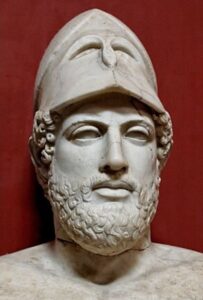What do you know of Pericles?
He was a prominent and influential Athenian statesman, and his story basically tells us that the world hasn’t changed in nearly 3000 years. Does it ever?
In the years between 500BC and 400 BC he was the driving force as the Greek democracy was evolving. As it evolved it produced a lot of problems.
The Problems of Democracy he solved
One of the biggest problems was that to be properly democratic every citizen of Athens became a member of the council. There was a problem, which was that they all had to make a living, so they didn’t attend! Pericles suggested a lottery, with the name of every free Athenian put into a pot and the first 500 names chosen would form the council. This was his idea, that has now grown into our present-day elections, maybe his idea was better!
However, this led to another problem that if those elected members were to attend the council regularly, who looked after their business? They couldn’t be at both places at once, so it was costing them money. He therefore came up with the idea of paying council members for their attendance, another idea that is still operating today. We even have attendance allowance at political meetings, be them either in parliament or in local government, this comes from Pericles.
Pericles’ next idea was very good but not one we have continued; he created a limit of two sessions per member. His aim was to reduce corruption, except it went the other way. You see as they were only there for two sessions some councillors wanted to make as much money as they could. Therefore, some of them were happy to take bribes.
To solve this problem, he came up with the idea that a different chairman be appointed for each day. In a way it worked, and definitely meant that the balance of the decision making moved from the wealthy merchants.
He wasn’t always popular
In the 431BC war between Athens and Sparta, he suggested bringing the whole population inside Athens’s walls, encompassing Piraeus harbour. His reasoning was that the port could supply Athens, while attacking Sparta by sea. It was agreed and it happened, however it exiled the rural population. They then had to stand by and watch the Spartans devastating their crops, they turned in fury on Pericles, who refused to recall the assembly.
Fortunately, a killer plague then struck, saving Athens. Unfortunately, when it was over the Spartans returned the next year, the assembly voted to sue for peace, but the Spartans rejected them.
Now the people all turned on Pericles, who told them:
- we are all in this together
- these events have weakened your morale
- your current losses would be nothing, set against defeat
- you voted for the war so don’t surrender
They agreed, but were not happy so fined and sacked him, and then they, wait for it, declared he was the man for the job and re-elected him!
This happened in 430BC in the world’s first democracy, does it still happen today?
Was he the only person?
This has been about Pericles, but two other people were very involved in the birth of Greek democracy:
- Cleisthenes
- Ephialtes
It was in fact an evolving process, that went on for several years.
The Musical
Our sister site Educational Musicals have put it together in a 50-minute musical to tell you the story of the birth of democracy.
You can download it today if you go to Athens – The Birth of Democracy where you will hear two of the songs and read two pages of script. Then download it and you can start rehearsing it today.
Isn’t history fun
Some questions to ask:
- Who was Pericles and what was his role in Athenian politics during the 5th century BC?
- What were some of the problems that arose as Athenian democracy evolved, and how did Pericles address them?
- How did Pericles suggest addressing the issue of citizen participation in the council, and what modern-day electoral practice does it resemble?
- What was Pericles’ solution to the problem of council members needing to attend sessions while also managing their businesses?
- Describe Pericles’ attempt to limit corruption in the council and the unintended consequences that arose.
- How did Pericles attempt to balance decision-making power away from wealthy merchants in Athenian society?
- What controversial decision did Pericles make during the war between Athens and Sparta, and how did it impact his popularity?
- How did Pericles respond to criticism and opposition from the Athenian populace during the war?
- What role did Cleisthenes and Ephialtes play in the development of Greek democracy, and how did their contributions differ from Pericles’?
- Reflecting on the evolution of Greek democracy, do you see parallels between the political challenges faced then and those faced in modern democracies?
For more on this:



